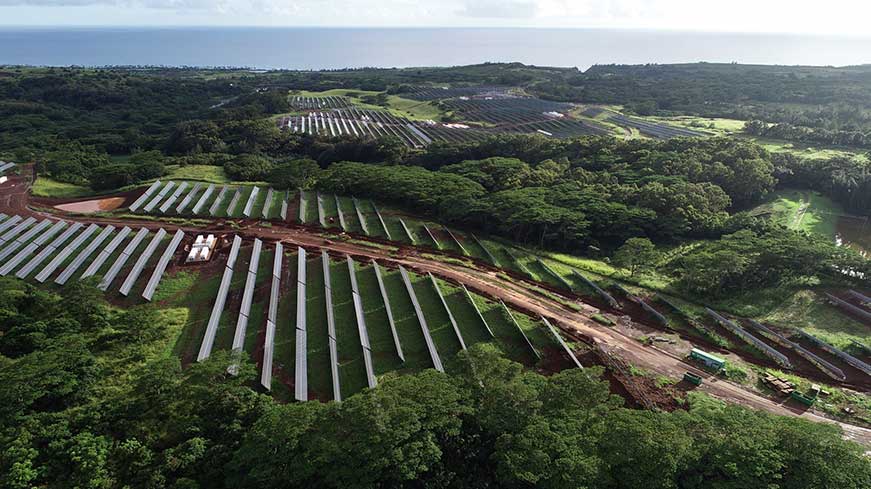

Credit: AES Corp
A new report from a major market analyst has highlighted the enormous potential for solar and battery projects to displace gas plants and how dramatic cost reductions make them by far the cheapest source of new firm generation capacity in many US States.
The report from S&P Global Market Intelligence summaries the considerable market shift in the US towards the inclusion of battery storage systems into large-scale solar projects, and gives unprecedented detail in how that pricing is being developed..
What is clear is that a market has emerged for “PV peakers” in the solar-rich south-west states of the US, taking advantage of the additional dispatchability that combined solar and storage projects provide.
Falling technology costs have allowed solar and battery storage projects to secure power purchase agreements at very low prices, falling to a range of $US30-$US40 per MWh, authors Garrett Hering and Stephanie Tsao write. The storage component is priced at between $US5 and $US10/MWh.


The report provides further evidence of the dramatic reductions in costs that have been achieved by solar PV projects, and the S&P Global report suggests that the cost of solar and storage projects have fallen by more than three-quarters since 2015.
Going back over recent years, the authors note how the Crescent Dunes Solar project in Nevada, one of the first in the US to combine solar generation with storage, required a power purchase agreement of $US135 per MWh when it was first developed in 2015.
By 2021, the pipeline of projects that will be built in the southwest of the US will be underwritten by PPA’s in the low $US30s/MWh. This includes projects across multiple States, including California, Nevada, Colorado and Arizona.
“I don’t know much lower prices can go. We’ve had a race to the bottom going on here for some time,” they quote senior research analyst at Navigant Consulting Inc. Alex Eller as saying.
The island state of Hawaii has also emerged as an ideal location for new solar and storage projects. Hawaii currently has some of the highest electricity prices of all US states as it is heavily dependent on imported fuels for electricity generation.
Wholesale electricity prices for fossil generation in Hawaii, which is predominantly provided by oil products, is around $US150/MWh, almost triple the wholesale electricity price observed on the US mainland.
“This trend is most apparent in Hawaii and the western U.S., where multiplying solar-plus-storage power purchase agreements, or PPAs, reflect a maturing class of competitively priced peak-power assets,” the report said.
Hawaii has a lack of its own non-renewable energy resources and is heavily reliant on importing fuels, particularly oil and coal from offshore. Hawaii has recently banned the development of new coal generation projects and has pledged to transition to 100% renewable electricity by 2045.
These circumstances have provided an optimum opportunity for solar and storage projects, which can now out-compete established fossil fuel generators, while providing reliable dispatchable generation.
While Hawaii’s location still increases the costs of developing projects in the State, falling costs of solar and storage technologies still allows it to undercut the costs of generation from oil.
Project developer AES Corporation has been able to develop the Kuihelani Solar and Battery Storage Project on the island of Maui, with a PPA of under $US78 per MWh.
State Governments have maintained support for renewable energy developments in the United States, even after the election of Donald Trump as president. The Trump Administration has made steep cuts to support for renewable energy projects, and actively advocated for a revival of the coal industry.
Many US States have stepped in to fill that gap, which as included states pledging to transition to 100% renewable energy.
There are 30 big batteries operating across the main grid, and they have cemented their…
There are hopes techniques borrowed from the oil and gas industry can boost the viability…
Labor and the LNP might be approaching the federal election from diametrically opposite ends of…
Australia's first privately owned wind farm, which began operations in 2001, will cease in 2027,…
South Australia loses patience with Gupta's GFG Alliance and seizes control of the Whyalla steelworks,…
The six turbine wind project was first proposed to avoid a new high voltage power…